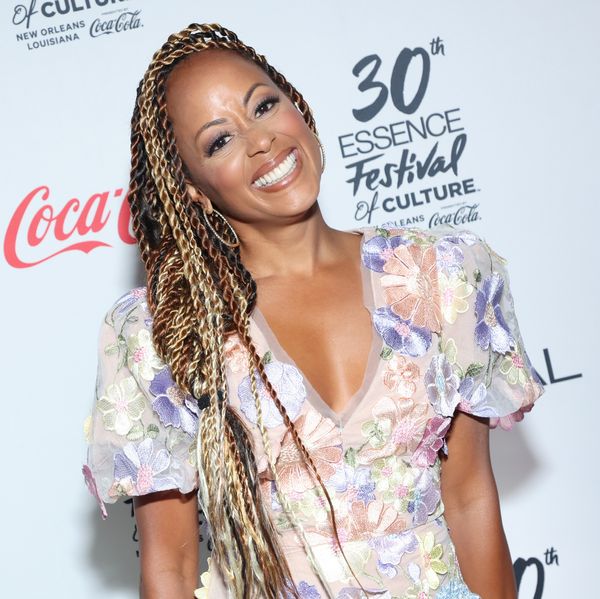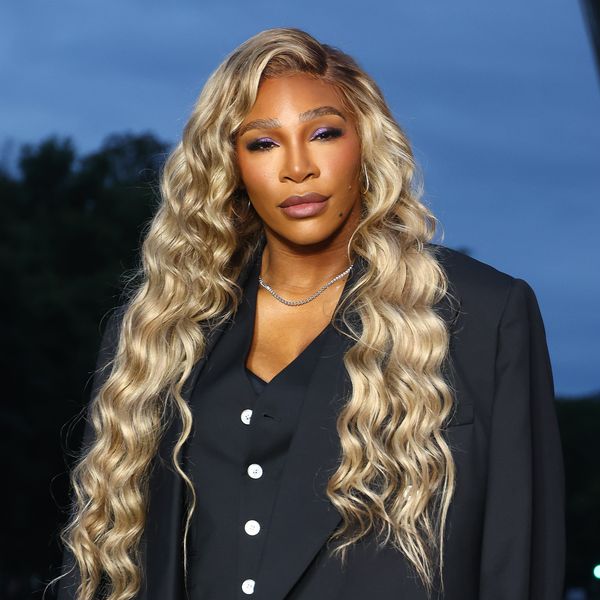Adrienne Houghton Says This Diet Change Helped Her Win Her Battle With Excessive Weight Gain

In the past, Adrienne Houghton has been candid about her battle with Hashimoto's Disease and subsequent weight fluctuation, but according to her, a change in her diet was the key to effectively her autoimmune illness and snatching her power (and her waist) back.
Earlier this year, the talk show host revealed that she and her husband were making an attempt to transition fully into a vegan lifestyle and although Israel may still be a carnivore at heart, Adrienne says that her plant-based diet has both improved her quality of life and level of self-confidence. On a recent episode of The Real, Adrienne explained:
"I know I said last season that I went vegan, I stuck with it all summer. Staying with a plant-based diet, it has made a world of a difference. A lot of you guys know I suffer from Hashimoto's, which is an autoimmune disease, so it has been really helpful for that. I just feel great and I'm happy to be back."
In February, both Adrienne and her co-host, Tamera Mowry-Housley, shut down pregnancy rumors and made it very clear that the food baby struggle is real. Hashimoto's, which causes an inflammation of the thyroid, often causes skin and hair dryness, depression, constipation, and weight gain, some of which Adrienne says she has experienced firsthand.

"This is not a baby, this is sweet potato pie. We have a health condition! I'm not pregnant! I have Hashimoto's! It's hypothyroidism. Yes, I have a fat neck! There is a reason!"
She explained that although she had not seen her fluctuating weight as an issue in the past, over time, a combination of internet trolls and self-pity began to make her feel more and more self-conscious.
"If I'm honest, my weight gain in the last few years has been like a struggle for me where I'm like, I never looked at myself as being overweight. And it was weird to hear so many comments at one point that I was fat, and 'Oh my God, she let herself go!' I was like, 'Whoa.' So that was a little bit weird."
While Adrienne credits her new vegan meal plan for allowing her to manage her illness and snatching her waist to the Gods, ultimately, it was a mindset shift that helped Adrienne become the best version of herself.
"I just did what I had to do to be comfortable in my own skin. And I think that's the most important thing. It wasn't necessarily to please other people. I actually, genuinely, didn't like the way I looked. And every day it's a work in progress. You know, girl get up and do some cardio."
Adrienne says going vegan was less about a number on a scale and more about her commitment to self-love. While Adrienne's transition wasn't immediate, considering herself an "almost vegan" in the beginning stages, she stayed consistent and it paid off. Along with eating healthier and drinking a bottle of her favorite rose water every day, Adrienne also says making time to work out helps her keep her physique and her perspective on track:
"More than looking good, it's actually healthy for you to eat healthy and actually get a little workout in. So as I get older, I get that it's going to be harder and harder, but I'm up for the challenge."
Featured image by Instagram/@adriennebailon.
- Adrienne Bailon Talks About the Realities of Failing Marriages ... ›
- Adrienne Bailon's Wedding Cake and Reception Photos | PEOPLE ... ›
- How Adrienne Bailon Lost 22 Lbs. in Just Two Months Ahead of Her ... ›
- Adrienne Bailon Reveals How She Got Down to 101 Pounds for Her ... ›
- Vegan Adrienne Houghton Shows Off Weight Loss During The Real ... ›
- Adrienne Bailon Shows Off Weight Loss After Adopting Vegan ... ›
- Adrienne Houghton Gets Real About Gaining Weight In The Public ... ›
Taylor "Pretty" Honore is a spiritually centered and equally provocative rapper from Baton Rouge, Louisiana with a love for people and storytelling. You can probably find me planting herbs in your local community garden, blasting "Back That Thang Up" from my mini speaker. Let's get to know each other: @prettyhonore.
We have less than 40 days left in 2024, and while I'm not one to rush goals just because it's the end of the year, it can be fun to challenge yourself to think about ways you'll close out this year big.
Whether you're planning to meet a certain financial or fitness goal, or you're simply trying to maintain and build on the progress you made this year, having something to look forward to is always a good look. Setting actual goals, according to research, actually leads to more success than just playing things by ear. So here are a few to get you started, sis:
(Disclaimer: Not everything is for everyone, so do like my Granny always says: "Eat the meat. Spit out the bone." Take on five out of the 40 and focus on that for the remainder of the year, or do them all. Either way, this is just to get you started.)
40 Ways To End The Year Strong and Inspired
Money Moves

Riska/Getty Images
1. Increase your retirement (or other savings/investment) contributions by 1%.
Experts have found that you could be leaving money on the table by not upping your contributions when you can.
2. Cancel two to five subscriptions.
You could be missing hundreds, even thousands, of dollars a year due to sneaky price hikes and "updates."
3. Create a "fun" in a high-yield savings account.
This is especially important if you struggle with the dreaded b-word (budget) and will make next year's efforts a lot less intimidating. Even if it's $10 a month, do it.
4. Put on your big-girl panties, and set up automatic transfers and payments for at least one bill.
It reduces the stress of managing bills, lessens the chance of a missed payment---and the fees that come with that---and there can be cost savings for doing so.
5. Invest in a cleaner or housekeeping service.
Bosses who value their time (and mental health) invest their dollars into areas where the time they'd spend doing those tasks themselves could be better used to focus on other money-making projects. (And yes, rest is part of that.) Get a housekeeper, sis, or drop off that laundry, even if it's once per month.
6. Donate to a charity.
Beyond the tax benefits, it's a win-win for the greater good of communities you care about.
7. Review your insurance policies and negotiate a better rate (or move on) before their end dates.
Experts often agree this is a small but mighty step to take each year, especially since insurance rates are competitive, you could be spending more money than you need to (or not enough) and your insurance rates can affect your mortgage payments.
8. Call your loan provider and refinance.
As interest rates fall, “millions of borrowers may be able to refinance and get more affordable payments. As interest rates eased down to 6.5%, about 2.5 million borrowers could already refinance and save at least 75 basis points (0.75%) on their interest rate,” the Consumer Financial Protection Bureau reports. You can also refinance student and other types of loans.
9. Stop buying individual items and stock up via going bulk.
Research has found that, among 30 common products, buying in bulk could save you 27% compared with buying in lower quantities. Water, paper products, and baby products like diapers, toiletries, and garbage bags are the top items where people see the most cost-effectiveness. (This has been a lifesaver for me—children, large family, or not—especially when it comes to toothpaste, deodorant, toilet paper, and feminine hygiene products, saving stress, time, and money.)
10. Go cash-only for the holidays.
If you set smart goals and stick to limits on things like gifts, going out to eat, or groceries, you'll see the benefits of this. Cash-stuffing is one method recommended, but something as simple as taking a $10 bill out for lunch, disabling that card for an hour, and leaving your card in a safe place at the office can give you that mindset jump start to see how far you can take your money without the need to splurge.
Love And Romance
11. Say "no."
There are clear mental and physical health benefits to saying no including the setting of healthy boundaries, creating time and energy for other self-care activities, and protecting yourself from physically harmful situations (i.e. unprotected sex or abuse). Just say it, clearly and simply, when you need to.
12. Set a fun, free, adults-only date night for once a week or twice a month with your spouse.
If busy, high-profile folk have touted the success of this, even you can make the time for quality time with your partner. And it's even better when it costs nothing. The best connections are made doing something chill, challenging, or outside the usual dinner-and-a-movie date. Play a game that allows you to reconnect, take a walk in your neighborhood to chat and laugh, or try a little erotic chocolate/edible liquid/paint episode a la Mea Culpa.
13. Go out with Mr. or Ms. "Not My Type."
I love my man, but if I were waiting out for my "type" at the time, we wouldn't be celebrating seven (going on eight) years together. Sometimes having strict, unrealistic expectations for a spouse (especially related to things like height, physical features, or career path) is what's keeping you alone and lonely.
Take the pressure off and explore all your options. I'm not telling you to stop popping the balloon on the guy who earns $20,000 less than you if that's a hard no that Jesus himself told you to skip. I'm asking you to explore other options and see what else God might have out there for your love journey.
14. Immediately apologize and pray together.
I've learned that always being "right" isn't always ideal when you truly care about someone and you're in a relationship for the long haul. Defaulting to an apology when necessary, even when things aren't 100% resolved, is a good way to prioritize peace and save your energy for more worthwhile battles. Research has even supported the benefits of apologies in relationships, and how couples married for five or more years do it often.
15. Get a Rose and discover true self-love.
Do I really have to explain this? You've gotta know what satisfies you, and how better to figure that out than to practice self-love in the bed by yourself? You can also try this with a partner, but as a woman who got on this train very much later in my sexual activity journey. I have a lot more learning to do on my own, and even in a satisfying relationship, I like to find out new things about myself, by myself.
Figure out what you're into, watch what you want to watch, and read what you want to read to define pleasure for yourself. There's a freedom and empowering element there especially if you're used to prioritizing pleasing your partner.
16. Be direct and have the "money talk" with bae.
Money issues are one of the leading causes of divorce, so you need to have those conversations before you even think about marrying someone. And true, nobody can predict the future so you won't be able to avoid some challenges altogether, however, talking with your potential spouse about how they view money, their spending habits, and the pain points in terms of their approach to money management can at least give you a glimpse into what's in store if you do walk down the aisle, move in with them, or decide to share a bank account/business/child with them.
17. Invest in the "paid" version of that dating app.
I know plenty of successful, married folk who did this and met "the one" as a result. Let's be honest: The free version is for playing around. I had a lot of fun with my "free" profile back in the day, trust me. Upgrade that photo, profile, and package, and see if the quality of your dating adventures changes when you're serious about finding a true partner. Dating coaches and matchmakers cosign this.
18. Solo travel to meet that long-distance connection.
Sometimes, your perfect match isn't within 100 miles of you, and that's okay. Make it an adventure, enjoy the memories, and book that ticket. I met my man this way and it's been a whirlwind escape ever since. If you're not comfortable traveling solo, travel or (network to plan travel) with a group via Facebook.
Career And Business

Riska/Getty Images
19. Schedule coffee or virtual meetups with smart people from your graduating class, previous employer, or current employer.
I have gotten many freelance opportunities by doing this. It's as simple as connecting and offering value (or simply learning how you can better equip yourself to do so.) It's also a great way to expand your network, spark new friendships, or find out about new job opportunities.
20. Invest in a well-made suit.
I don't care what industry you're in, a suit says "power," and it's not as old-school or out-of-style as you'd think. Plus the whole experience of looking for a new one (or getting one tailored) is fun and affirming. Try these options. I swear, anytime I wear a blazer, I'm treated like a celebrity or boss, especially when traveling. I was once upgraded to first-class wearing a yellow blazer outfit, and the airline professional literally said, "You look like somebody important. Here you go."
21. Volunteer for a worthwhile project or cause that's important to your company.
If you're overworked and underappreciated, skip this one, but if you truly have the time, love what you do, and want to advance, this move is clutch. Volunteering for extra projects got me where I am today in media because I had foresight, and knew that was the only way at the time to leverage relationships, and I was able to challenge myself to learn skills that 20 years later are still bankable. That VP you can't get a meeting with will be at that gala your company is planning, so join that committee, sis.
22. Write down why you deserve a raise and ask for it in your next one-on-one.
Gather those receipts (ie sales increase numbers, KPIs met, deals closed, people acquired via recruitment, the impact of systems updates, or other tangible success metrics) and ask for that raise before the first or second-quarter budgets are being finalized.
23. Instead of quitting, write down your exit plan.
While revenge quitting is set to be a thing next year (and maybe you're among those who will be leading the trend), try the better boss move and quit with a real plan.
24. Start automatically separating that estimated self-employed quarterly tax estimate.
If you have side hustles (or you're collecting 1099 income,) baby, you do not want to neglect those quarter tax payments. Talk to a professional, do your research, and set up automatic transfers to an account specifically for paying these at the appropriate due dates.
25. Sign up for a free one- to 11-week course related to your industry—or the industry you want to be in next year.
Institutions like Harvard University and platforms like Coursera offer free courses that can enhance your skills. You can also invest in certificate courses with accredited colleges as well as tech training.
26. Hit "Easy Apply" for 10 dream jobs listed on LinkedIn.
While you shouldn't solely rely on this when actively job-seeking, using this convenient LinkedIn option is a great way to get into the habit of applying for positions. And if you're already employed, you should still be "dating" other employers if you're looking to make a move in the next six months. Keep your interview skills sharp, practice toughening up for the "nos," and get a bit of an ego boost in the process.
Self-Care And Wellness
27. Pre-schedule three month's worth of massages.
Oftentimes this is cost-effective since some spas offer deals for multiple bookings. Also, it makes an act of self-care deliberate and important, not an option. When you get that reminder call, you'll know it's real.
28. Fire that therapist and try another one.
Cultural competency in mental health support is one major problem that can hinder Black women from even bothering with therapy. And who wants the added stress of spending multiple, paid sessions explaining why something is a microaggression? Cut the cord and move on to try someone else, either via a Black women therapists channel or recommendations from others.
29. Join a small group at church.
Bedside service ain't gonna cut it and neither is going to the usual Sunday service. Join a smaller group and upgrade your efforts to connect, network, and elevate spiritually. Even if virtually, take a step to dig a bit deeper with more targeted Bible study and discussions.
30. Say no, even to loved ones.
This is on here twice, for a reason. Saying no is the simplest, most powerful micro-action you can take today to make 2025 better. No explanations. No guilt. Say no.
31. Choose one "luxury" beauty product for skincare and stick to it.
This was trending big on social, especially for millennials hitting their 40s. There's just something so freeing about not giving in to every trend and sticking to the basics that work, especially when there are quality, healthy ingredients involved. Put those orders on auto-renew.
32. Sign up for a new sport or fitness class just for fun, not for results.
It's great to be on a weight-loss or weight-lifting journey, but try something just for the fun of it. Switch things up with a couple of these fitness activities.
33. Book a staycation.
Leave the passport at home and explore a nearby community or another town in your state. There's so much enrichment in your own backyard right here in the U.S., and you don't even have to break the bank.
34. Pre-schedule your mammograms, Pap smear, and peri-menopause checkups for next year.
Take control of your health by pre-scheduling essential appointments like mammograms, Pap smears, and peri-menopause check-ups for 2025. Prioritizing these screenings early ensures you stay on top of your wellness and make time for self-care in the new year.
35. Cut off support of beauty and wellness professionals whose customer service is below standard.
This is another one that many Black women have been vocal about—from unrealistic pre-appointment requirements, to booking fees, to long waits, to unsavory in-salon experiences. Spot the red flags early, and just stop accommodating foolishness. Support salons or experienced stylists who are kind, have proper systems in place and value your time.
36. Schedule five to 10-minute moments of silence on your calendar.
Again, wellness is not optional, and if it's not on my calendar, it's not official. Sit quietly. Pray. Meditate. Or do nothing. The benefits of silent moments are almost endless.
37. Download a meditation app.
If you've found that meditation is difficult to schedule or to even start, an app can help. Try this, this, or this one, and take that step to embrace something new to enhance your wellness routine. If you're tired of downloading apps, create a playlist for meditation via Amazon Music or Spotify and schedule a reminder to do it once a day or week.
38. Invest in a healthy meal prep or delivery service.
Time is emotionally expensive, so save as much of it as possible. Getting into meal prep to keep to your goals is a great way to save time, stress, and effort. The health benefits of meal prepping have also been proven via research.
39. Create a positive playlist on Spotify, Amazon Music, YouTube, or other streaming platform.
It can be podcasts, music, affirmations, or somatic sounds. It's a game-changer. You can even set an alarm to wake you up to start your day with the positive playlist. Not into creating your own? There are plenty to choose from with a quick search.
40. Set up reminders for Alexa (Siri or other AI) to remind you, "You are loved," and "You are okay."
This simple effort can boost your endorphins and remind you that you're indeed, not alone, and you will be okay, regardless. To set mine up, I simply commanded, "Alexa, remind me everyday 'Jesus loves me,'" and like clockwork she does. She almost scared the ish out of me one day when I'd forgotten the reminder was active, but it was the reminder I needed when anxiety had gotten the best of me that week.
Let’s make things inbox official! Sign up for the xoNecole newsletter for love, wellness, career, and exclusive content delivered straight to your inbox.
Featured image by
While there's always an element of gloom and doom in the news when it comes to employment and the job search, it's not all bad out in these career streets. Some jobs will not only be in demand in 2025, but they'll be paying even higher salaries.
In fact, Mercer, a human resources and financial services firm released a few very optimistic insights in a recent report. Companies are set to increase compensation budgets by 3.3% for merit increases and 3.7% for total salary increases for non-unionized employees in 2025, despite economic uncertainty. They’re also “prioritizing talent investment, with 69% expressing confidence in their compensation budget projections, and plan to promote 9.3% of employees in 2025.”
If you're looking to change careers or even figure out your next move in your current one, you'll want to look into these jobs, per the experts, that are set to see pay increases next year, allowing you to make that vision board a reality:
1. Human Resources (“People” or “Talent”) Manager
Average salary: $137,212, or more with specialty, experience, and advanced degree
According to the U.S. Bureau of Labor Statistics, the human resource manager's role is expected to see a 6% uptake in demand over the next 10 years—faster than the average job growth rate.
In this role, you oversee senior levels of strategic talent management and recruitment—from handling complaints and bridging the gap between management and their teams to managing learning and development, among other duties.
2. Renewable Energy Project Manager
Average Salary: $95,206, a bachelor's degree in engineering or related subjects, with more salary for advanced degree
Energy firms and corporations are among those reporting the highest planned overall salary increases in 2025.
In this role, you’ll be in charge of projects centered on renewable energy projects, such as solar and wind farms. You’ll handle budgets, progress reports, site investigations, and feasibility studies.
3. Digital Marketing Manager
Average Salary: $126,704 or more with bachelor's degree and/or practical experience showcasing successful projects
Communications is another industry set to offer the highest salary raises next year. As a digital marketing manager, you'll have hands-on experience and must have a knack for leveraging digital platforms to promote products, services, or brands. You’ll work with a range of niche digital media, including social media, email, online advertising, and content creation. You'll also manage teams to meet client and campaign deliverables to target and engage with audiences and customers.
4. Insurance Actuary
Average Salary: $135, 203, with a bachelor's degree in actuary science, accounting or related, with more for experience, advanced degree
While AI is impacting the insurance industry, experts are predicting that experienced and detail-oriented actuaries will still be in high demand in 2025. For this role, you’ll need to have the perfect knowledge mix of math, statistics, tech, and business modeling when making strategic decision-making. When it comes to insurance, you’ll decide the risk of potential events, and help businesses develop policies that minimize the cost of a risk.
5. Cybersecurity Engineer
Average Salary: $122,890, bachelor's degree in computer science or related field, and more with advanced degree
Tech is an industry also expected to have high instances of salary increases next year, and cybersecurity is apparently booming. You’ll be in charge of coming up with the networks that protect against cyberattacks, cybersecurity procedures for a brand or company, and the monitoring and testing systems to keep them up to date.
6. Psychiatric Nurse Practioner
Average Salary: $153,643, bachelor’s in nursing and master’s, with more for DNP (Doctor of Nursing Practice)
This specialty is the “fastest-growing choice” among nurse practitioner students, and the job remains in high demand even with the high volume of supply for the role due to the increased need and prevalence of mental health issues in the U.S. In this role, you’ll lead in individualized treatment plans, prescribing medications (DNP), providing psychotherapy, and implementing behavioral interventions (DNP).
Let’s make things inbox official! Sign up for the xoNecole newsletter for love, wellness, career, and exclusive content delivered straight to your inbox.
Featured image by Ijubaphoto/Getty Images









